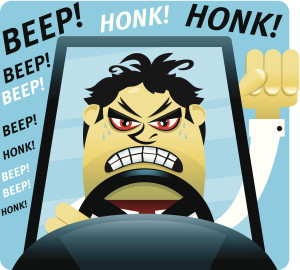
Summer is the time of road trips to the beach or the mountains. The roads are busier than ever with parents wanting to take their kids to the local park to get out of the house during the summer. New research from AAA auto club suggests that more Americans are engaging in road rage, or aggressive driving. In fact, almost 80 percent of the drivers studied admitted to expressing anger or road rage when they were on the road. It’s not only happening in large cities and major thoroughfares, as one incident on a four-lane country highway outside of Tulsa, Oklahoma, occurred when a pickup truck rammed into a car while driving. The car hit the guardrail. The pickup drove off. The teens in the car were injured from the airbag but not seriously hurt from the accident. Road rage is a significant problem, but there are ways to deal with it.
What Is Road Rage
The term is thought to have originated in the late 1980s in Los Angeles when a rash of freeway shootings occurred. Since then, the number of incidents has risen. The U.S. National Highway Traffic Safety Administration has a formal definition of road rage: when “an individual commits a combination of moving traffic offenses so as to endanger other persons or property; an assault with a motor vehicle or other dangerous weapon by the operator or passenger(s) of one motor vehicle on the operator or passenger(s) of another motor vehicle caused by an incident that occurred on a roadway.” Road rage is more than a traffic offense. It’s also a criminal offense.
Road rage manifests itself in many different forms:
- Shouting verbal threats or making rude gestures at other drivers
- Threatening or using a firearm or other weapon
- Throwing objects from a moving vehicle with the intent to damage another vehicle
- Cutting people off or preventing someone from merging
- Aggressive driving
- Causing a collision with another vehicle with intent
Most jurisdictions prosecute road rage cases under assault and battery laws or even vehicular homicide laws, because many places don’t make legal distinctions between aggressive driving and road rage. For example, the driver in the Oklahoma incident above is facing felony charges of assault with a deadly weapon. Some psychologists believe that road rage is a mental illness, but currently it is not recognized as one in the “Diagnostic and Statistical Manual of Mental Disorders” (DSM). However, one survey did find that the behaviors associated with road rage were often correlated with those of intermittent explosive disorder, which is a disorder recognized by the DSM.
Dealing With Road Rage
When you’re dealing with a driver who is driving aggressively, don’t respond. Try to let the person get past you and just get away. If that isn’t an option, stay on well-traveled streets and try to get the attention of a police officer. Call 911. Pull into a police station or parking lot where you are around security. This is usually enough to make someone break off. At the very least, get the make, model and color of the vehicle and the plate number to file a police report if you believe the encounter warrants it.
Just remember, you can only control your own driving. Make sure that your driving habits are not aggressive. Be courteous on the road and don’t tailgate. Let cars pass you by. Don’t let the stress on the highway affect you. Learn techniques to stay calm, even under pressure. Take a defensive driving class. You don’t need to engage with anyone who is giving you obscene gestures; just focus on getting to where you’re going safely. A little tolerance goes a long way on the road. Save your venting for your friends and family, who care about whether you get home or not.

